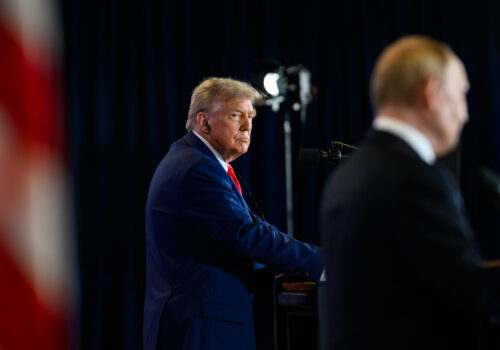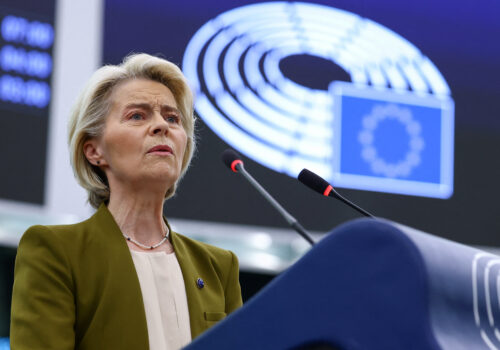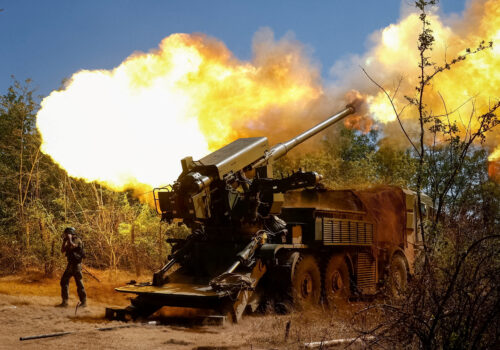What Kissinger would do about Putin and Ukraine
From 1954 through early 1970, US and Chinese diplomats conducted 134 meetings, most of them in Warsaw. Their ostensible purpose was to build constructive relations between the two long-estranged nations. They failed to do so.
When I joined Henry Kissinger’s National Security Council staff in 1969, he was just beginning to focus on relations with China. Reviewing what the past fifteen years of diplomacy had produced, the statesman characterized this string of conversations as “sterile,” dubbing them the “longest continual talks that could not point to a single important achievement.”
Serious progress came only when Kissinger and Chinese Premier Zhou Enlai engaged in the process, after which US President Richard Nixon undertook his historic visit to China to meet with Chairman Mao Zedong and begin improving relations. There were, of course, still deep differences to be worked out, but there was also a will on both sides to try to resolve the differences.
I’ve been thinking about the fruitless fifteen years of talks that preceded the US rapprochement with China as I’ve observed the similarly unproductive process playing out between the United States and Russia now. This lack of progress is due largely to the Russian side: Moscow has made wildly unreasonable demands. Russian President Vladimir Putin has hypocritically talked about a desire for peace and then escalated attacks on Ukraine. And the Kremlin continues to deny the legitimacy of Ukrainian President Volodymyr Zelenskyy and the Ukrainian government. But the lack of real progress is also due in part to an often tepid and unclear US response regarding new sanctions against Russia and new sales of advanced arms to Ukraine.
From his actions and the tenor of his rhetoric, one can surmise that Putin has no intention to negotiate a constructive outcome at this time. He is using these talks as an excuse for delay, while he attempts to seize more Ukrainian territory, discredit the Ukrainian government, divide the West, and weaken NATO, hoping that the United States will lose interest and resolve in supporting Kyiv. Since his talks with US President Donald Trump in Alaska in June, Putin has only stepped up his attacks against Ukraine.
I had the opportunity to work closely with Kissinger as his senior economic advisor for five years in the White House. This work included opening US-China relations, negotiating in the Middle East, participating in a wide range of summits around the world, and addressing a host of Cold War issues. For the next fifty years—including four in which I served as vice chairman of his firm, Kissinger Associates—we were close friends and confidants on numerous issues.
Many of the above-mentioned actions actions by Putin and Russia would have come as no surprise to Kissinger, who was a realist, although it took him a while in the years before his death in 2023 to reach his final negative conclusions about Putin and his objectives. Earlier, he had hoped that the United States could work out a cooperative relationship between Moscow and Kyiv recognizing Russia’s position that the two countries’ history and cultures were intertwined, and for that reason—and because of Ukraine’s position on Russia’s border—that the Kremlin had a unique set of interests there. Although he was not sympathetic to this argument, Kissinger also saw that Putin did not want Ukraine to drift too close to the West and succeed economically (in contrast to Russia) by adapting market practices and close trade relations with the European Union. But as Moscow’s desire for influence in Ukraine turned into belligerence, his attitude changed sharply. And Putin’s recent actions almost certainly would have significantly toughened Kissinger’s negotiating approach—in several ways.
Here are several steps that I believe Kissinger might have advised the current White House to take:
Insist on concrete, trust-building actions and preconditions for any new summits
Kissinger believed that discussions between US and Chinese officials should be aimed at building trust as a common objective—rather than engaging in hollow, theatrical meetings. His negotiating counterpart, Zhou, felt much the same way. Each had very different points of view on most key issues. But they were deeply serious about their negotiations, which were meticulously planned. Both men concluded that to achieve productive outcomes, each country had to find ways to narrow, if not fully resolve, long-standing differences. They saw commitments and concrete actions by both parties as essential. In the area of trade, for instance, both sides reduced several barriers and initiated a series of high-level consultations on the major geopolitical issues and threats to stability of that period.
In recent negotiations with Russia, the United States has made several concessions—often at the expense of Ukraine. But there has been no reciprocity from the Kremlin. Russia is unwilling to give back any part of Ukrainian territory that it invaded and now occupies. It is unwilling to accept the West’s insistence on credible security assurances for Ukraine and the broader region, and demands a veto over them. And it is unwilling to agree that Ukrainian and European leaders have a major interest in the outcome of negotiations and thus should have a key role in them.
Putin is smart and experienced; no one should underestimate him or his foreign minister, Sergei Lavrov, who has lived in the United States and understands that Americans often get tired of long, indecisive, and expensive wars. Both men clearly are hoping for that once again.
In my interactions with Putin dating back to the early 1990s in St. Petersburg, I have found him to be a strongly committed nationalist as well. He holds deep resentment that, in his view, the United States and the West were instrumental in the dismemberment of the Soviet Union and for over a decade thereafter took advantage of Russian weakness. Over time, I witnessed in Group of Twenty, Group of Eight, and bilateral summits that he focused heavily on Russia regaining lost influence and lost Soviet territory—some of which went back to the tsars. This, as he saw it, required pushing back Western power and influence from Russian borders and generally weakening Western military capability and will in Europe. Moreover, Putin increasingly came to see Russian greatness as inseparable from his own.
So Putin happily takes in all the concessions he has obtained and enjoys symbolic gestures from Washington. In turn, he responds by escalating the war, denying the legitimacy of Ukraine and its president, and demanding impossible new concessions from Ukraine, the United States, and NATO.
Can negotiations in these circumstances ever produce trust between the parties and lead to constructive and credible Russian actions? If the answer is no, as it appears to be, there are few options other than the application of significantly greater Western pressure, especially in the form of much tougher sanctions, further and enhanced military support for Ukraine, and tangible evidence of prolonged American and Western resolve. Recent negotiations now appear to be nothing more than a mirage. The United States must avoid being drawn to that mirage and continuously misled.
Understand Russia’s fundamental economic weakness
Over the years, the United States has overestimated the strength of Russia’s economy, while Moscow has cleverly disguised its considerable economic weaknesses. Kissinger understood this well. And those of us who traveled with him to the Soviet Union, especially outside of Moscow, were acutely aware of just how weak its oil-centered economy was.
As Kissinger’s economic advisor it was my job to brief him on, among other things, the state of the Soviet economy. We had numerous discussions on the implications of what I and a number of my colleagues saw as its weakness—no matter what Soviet propaganda was telling us. Kissinger was quick to understand the nature and significance of these realities and how they related to US foreign policy and strategic objectives. He regularly informed the president of the weakness of the Soviet economy and the corresponding fragility of Soviet leadership. In the early 1970s, Kissinger also viewed this weakness as an opportunity to improve US-Soviet relations.
The United States and the West are constantly deluged by Russian propaganda asserting that the Russian economy is strong enough to sustain the current war indefinitely. It is not. Russian inflation is already about five times higher than inflation in the United States or most other countries in the West, and its budget deficit is higher this year than any since the full-scale invasion began.
If Russia were to engage in serious peace talks regarding the war in Ukraine, or some level of retreat in the country, that likely would not result primarily from Ukraine successfully pushing Russian troops back over the border (although this is a goal the United States should support by providing additional weapons to Kyiv). Such an outcome may be at least as, if not more, likely to result from additional measures contributing to Russia’s economic deterioration and a major new squeeze on its foreign currency reserves.
That process would be significantly accelerated—and, with it, Moscow’s willingness to negotiate a just peace—if the United States and its allies and partners imposed much tougher economic sanctions on Russia. The president’s support for the bipartisan Sanctioning Russia Act of 2025, which enjoys the backing of a big majority in Congress, would be a great step forward. The United States could also sanction Russian companies that produce and export oil and gas in order to cut off foreign payments to them, their transactions involving foreign banks, and their use of the dollar. And it could sanction companies around the world that sell equipment, spare parts, or ordnance to the Russian military.
The United States should also do more to enforce existing sanctions. The current sanctions regime is not being adequately enforced, sending signals to Putin that the West is not serious about such sanctions and Russia can continue to obtain revenue from abroad to fund its war machine. To show that the West is serious, and to stop these funds, this needs to change.
Therefore, Trump’s recent declaration that the United States will not impose new sanctions against Russia unless all other NATO nations stop buying Russian oil and gas is surprising. He is correct that all other NATO countries should significantly cut energy imports from Russia, but most have already done so. Only 3 percent of EU oil imports and less than 20 percent of gas imports now come from Russia. And these countries can’t go to zero overnight. But they are moving fast in the right direction and recently decided to move up the deadline to 2027 to end the EU’s energy imports from Russia.
As Kissinger, drawing on his experience in international power politics, would likely have pointed out, the decisive point here is not what a few other countries do or don’t do; it is what is in US interests. Supporting a free and democratic Ukraine and ending the war there decidedly fall into that category. Insufficient action to cut energy imports immediately by a small number of other NATO nations should not be a reason for the United States to delay imposing more and much tougher sanctions.
Russia cannot sustain its war indefinitely, especially if tough additional sanctions are imposed. More than one thousand multinational companies already have fled or curtailed operations in Russia, directly costing an estimated fourteen million jobs. Over two million highly skilled technology workers have left the country, along with large amounts of capital. Foreign investment has dropped from roughly one hundred billion dollars a year to nearly zero; there is no evidence of new investment on the horizon, even by Russia’s close pal China. This exodus has been well-documented by researchers under the leadership of Jeff Sonnenfeld of the Yale School of Management.
Ukrainian missiles and drones have effectively made Russia’s economic situation—and especially the situation of its oil and gas infrastructure—considerably worse, thereby imposing greater budgetary costs. Supporting Ukraine’s ability to intensify such measures would add to this damage and these costs. It is worth recalling that a major reason the Soviets withdrew from Afghanistan in 1989 was the prospect of bankruptcy.
Russian forces are capable of killing a lot more people and inflicting further damage on Ukraine. That is why immediate action by the United States and other nations to degrade Russia’s energy infrastructure further, and thus curb the country’s flow of revenues to support the war, is urgently needed—along with considerably more military support to Ukraine. Trump’s decision this summer to permit the shipment of roughly a billion dollars’ worth of American-made military equipment paid for by NATO allies—including High Mobility Artillery Rocket Systems capable of hitting Russian energy facilities and bases, as well as Patriot interceptor missiles—is an important step for which he deserves credit. These military shipments should be followed by more as soon as possible to dispel any uncertainties in the Kremlin about Western resolve to sustain support to Ukraine. Likewise, Trump’s recently reported decision to allow the United States to provide Ukraine with intelligence for long-range strikes on Russian energy infrastructure deserves praise.
Avoid the Warsaw negotiating trap
A Kissingerian perspective on diplomacy with Russia would recognize the need to avoid a further Warsaw-like string of ineffective negotiations. By producing no results, such negotiations undermine US credibility and buy Russia time to create greater havoc. The United States should send a clear message to the Kremlin that its refusal to negotiate in good faith, its continued unacceptable demands, and its deadly surge of attacks will come at a painful price. Trump’s statement after a meeting with Zelenskyy in late September that Russia is a “paper tiger” and Ukraine could win back all of its prewar territory was promising, but he stopped short of committing more direct US support. Now is an urgent moment for restoring such support and thereby augmenting assistance from other NATO nations.
Moscow’s ability to get away with delay is likely seen in the Kremlin as a test of Western resolve. If Russia has confidence that the United States and its allies will respond to its actions with only mild new sanctions and a few new weapons shipments, then the Kremlin will believe that it can go further in Ukraine—and beyond. Recent incursions in Poland, Estonia, Denmark, and Romania are likely evidence of this conviction.
Western leaders should expect much more of this and more serious provocations if the United States or its allies appear irresolute. Over time, the security of Europe, along with the security of the United States, will erode. Recent US decisions on arms sales and intelligence sharing may help dispel Russia’s sense that it can get away with such actions, but only if they are followed by further, intensified measures and greatly intensified and broader sanctions.
Moreover, as Chinese President Xi Jinping said in September at a Shanghai Cooperation Organization meeting, “The world has found itself in a period of turbulence and transformation. Global governance has come to new crossroads.” US leadership and support for its moral and democratic values, and for its friends and allies, will be critical in determining the path the world takes at this “crossroads.” If the United States does not effectively defend its core interests, then China is waiting to take advantage of the opportunities that emerge to increase its influence.
Stand on the right side of history
Nixon and Kissinger secured their place in history not just by building a more normal and stable US relationship with China, but also through their resolute measures vis-à-vis the Soviet Union during the Cold War. US President Ronald Reagan and Secretary of State James Baker did the same several years later. These leaders are seen by most historians, and those who rely on the United States as a partner and moral force, as having been on the right side of history.
This is Trump’s moment to position himself on the right side of history as well—to be remembered for generations for taking on an adversary that projects disdain for morality and democratic values, that has an appetite for aggression, and that engages in insincere and “sterile” negotiations, claiming to want peace while wreaking greater devastation and killing more people.
By acting boldly—right now—to impose greatly intensified sanctions, provide more and higher-capacity weapons to Ukraine, increase intelligence sharing with Kyiv, and diplomatically support this country defending itself against Russian aggression, Trump will put himself and the United States on the right side of history. And all Americans should rally behind the president if he does so.
Robert Hormats is a member of the Atlantic Council’s board of directors and a former US undersecretary of state for economic, energy, and environmental affairs.
Further reading
Tue, Sep 2, 2025
It’s time for Trump to put maximum pressure on Putin
Inflection Points By Frederick Kempe
The US president can have no further doubt about who he’s dealing with in the Russian president. There’s also little doubt about what is needed to end the war on terms that secure peace and preserve Ukrainian freedom.
Thu, Sep 11, 2025
Von der Leyen’s stirring message to Europe: Fight to survive
Inflection Points Today By Frederick Kempe
“Europe is in a fight,” the European Commission president said during her State of the Union address in Strasbourg on September 10.
Fri, Aug 29, 2025
Twenty questions (and expert answers) about the negotiations to end Russia’s war in Ukraine
New Atlanticist By
August saw a flurry of diplomatic activity to end Russia's full-scale invasion of Ukraine. As September nears, Atlantic Council experts share their insights on what to expect next.
Image: Henry Kissinger becomes US secretary of state on September 21, 1973. (Credit: PA Images via Reuters Connect)


